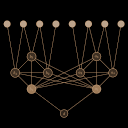beyond techniques to better utilize memory, the skill of refinding thought can be improved with memory argumentation systems. they are not so complex as the name implies, though: simply put these are ways of storing thoughts outside your head so you can easily access them later. the complexity in memory augmentation lies in the vast web of technologies needed to make these systems practical. that's why even as recently as a few decades ago these sorts of systems were in less use than they are today, and will likely be in greater use in the future.
working memory is short, but the way it functions shows us how to improve upon it. working memory appears to be primarily an auditory loop and visual sketchpad of you repeating things to yourself. it's an internal mechanism for resending information as if you were sensing it for the first time. we can take advantage of the same technique, but using your eyes and putting the 'loop' outside your head.
you can augment your memory by making things visible (as in literally writing them down where you can see them). when you can quickly look around to see things you don't have to put any effort into remembering them other than recalling where to look when you need something. this is a far easier task than trying to keep lots of information in your head, because if nothing else you can quickly rescan everything in your visual field to find what you want.
but for this to work the information has to be actually visible to you. this works well if, for example, you work on a computer and have a large enough screen that you can multiplex it to see many views at once: web pages, documents you're editing, chat logs, whatever. or, if you're working on paper or with a chalk board, writing all the stuff you need to recall where you can easily glance over to see it. all these work by taking the burden of remembering something in working memory and offloading it to a system so you don't have to keep it in your head, freeing up your working memory to have more space to work with new concepts as you think them up but haven't written them down.
if we take this same technique but make it about storing information rather than looking at it right away, you get the great collection of memory augmentation systems we know as notes, diaries, papers, web pages, and books. we take these technologies for granted today, but they have radically changed how much information a single person can use over the course of their life. five hundred years ago the story was very different.
until the invention of the printing press people had to personally write down all information they wanted to store. at best a person could hire scribes to help them, but this was still a very expensive proposition. by using movable-type printing presses people could write things for you, and all you had to do was buy a copy. this began a trend of accelerating growth in knowledge stores that today gives you orders of magnitude more information than you could ever use in a lifetime.
so now that we've covered memory and focus, there remains one last part to your natural wayfinding abilities to be improved: prioritization. this is the last piece of the puzzle of how you can better find your way.
